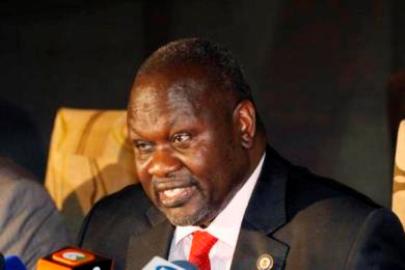South Sudan rebels say president Kiir a challenge to the world
July 9, 2015 (ADDIS ABABA) – South Sudanese rebels said the world should not allow president Salva Kiir to impose himself and continue as president by “usurping” powers of the people, adding the act of self-extension of tenure by three years was a challenge to the democratic nations across the globe.

But the armed opposition faction of the Sudan Peoples’ Liberation Movement (SPLM-IO), led by his former deputy, Riek Machar, said the action was unconstitutional and that president Kiir, governors and national and state legislatures were therefore illegitimate, plunging the country into constitutional crisis.
“This could only be seen in desperate, vision-lacking dictatorships like the regime of Salva Kiir where elected members of parliament refused to give power back to the people. The MPs decided to self-renew their electable memberships and that of the president just with the stroke of a pen despite expiry of their tenures,” said James Gatdet Dak, press secretary for the opposition leader, Riek Machar.
“Salva Kiir is usurping the power of the people in total disregard for democratic principles and practices. It is a coup against the people,” Dak told Sudan Tribune when contacted on Thursday.
The rebel leader’s spokesman challenged the international community, particularly democratic nations in the region and around the world, to not let Kiir get away with “this bad precedence” in the country and should therefore be isolated and declared illegitimate.
President Kiir’s elected five-year term of office expired two months ago on 21 May. Tenure for the elected national legislature expired on 8 March. A four-year constitutional mandate after independence for both executive and legislative leaderships and memberships which started on 9 July 2011 also expired on Wednesday 8 July 2015.
On Wednesday the rebel leader Machar called for a press conference in the Kenyan capital, Nairobi, in which he released a statement declaring president Kiir unconstitutional and illegitimate by 8 July midnight when his four-year term in office provided by the transitional constitution, 2011, expired.
However, when inquired whether this declaration meant the rebels were withdrawing from negotiations with president Kiir, Dak explained that the statement was not a withdrawal from the IGAD-led peace process, saying they wanted the world to understand that they would be dealing with an illegitimate peace partner.
“Our leadership will be propagating to the world to seriously take up the challenge by not leaving Salva Kiir’s despotic, illegitimate regime unchecked,” he said.
He said the international community should not this time repeat the “weakness of inaction”, pointing out that president Kiir’s forces carried out massacres of thousands of civilians targeting an ethnic group in Juba in the presence of embassies or foreign missions and no action was taken by those nations against him.
An alternative for a new political dispensation in the absence of elections, he said, was to reach a peace agreement and form a transitional government of national unity which shall implement the would-be peace agreement and prepare for the next elections.
He lamented it was unfortunate that the current ruling party and former guerilla movement (SPLM) was being led by dictators from its inception in 1983 whom he said had to violently resist positive changes and ideas and only to accept such changes after blood-letting. He cited the quest for self-determination and now democracy as examples.
He concluded by pointing out that from 9 July president Kiir was imposing himself on the people of South Sudan by usurping their power unconstitutionally, saying the citizens now had the right to overthrow him.
Fighting erupted on 15 December 2013 when internal debate over democratic political transformation and reforms within the leadership of the ruling party turned violent, plunging the country into national crisis and civil war.
Peace talks between the warring parties to try to end the 19-month long war are expected to resume this mid-July in the Ethiopian capital, Addis Ababa, mediated by the East African regional bloc, the Intergovernmental Authority on Development (IGAD).
(ST)
